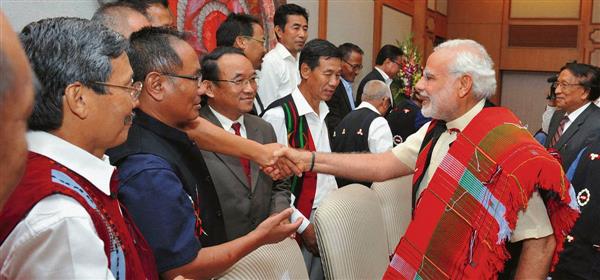After the Home Ministry directed the Assam Rifles to launch operations against NSCN(IM) in states neighboring Nagaland that are not under the ambit of the ceasefire agreement, the insurgent group has accused the centre of being “insincere” in its efforts to find a permanent solution to the seven-decade-old conflict and cautioned against testing its patience.
The Naga insurgent group said that “consequences could be disastrous” for both sides and claimed that the centre’s directive to intensify operations against its cadres had come as a rude shock. The group said in its statement, “In such a situation NSCN(IM) members cannot allow themselves to be sitting ducks. Our patience should not be translated as weakness and helplessness. Consequences will be disastrous for both parties. This is never in the interest of the ceasefire across Naga areas.”
The NSCN (IM) also said that the Naga people’s “sincere approach” and search for a permanent peace agreement had been manipulated ambiguously time and again to suit the Indian government’s “colonial divide and rule policy”, and that this reflected in the peace talks with the centre. It further said that the signing of a Framework Agreement on August 3, 2015, to find a permanent solution, was a “living document” to guide both sides to a final solution.
The group’s statement also said that the Nagas had come this far in search of a peaceful solution, and it was important now that the centre exercise the political will to push for a final deal. The group alleged, “But the Government of India still continues to waver. This is a sign of weakness and insincerity.”
There have been reports that the dialogue between the NSCN (IM) and the centre’s representatives is making no headway. Talks have been stuck over demand for a separate flag and constitution for Nagaland, both of which have been rejected by the centre.
The NSCN (IM)’s statement came on a day when chief of army staff General Manoj Mukund Naravane had arrived in Kohima as part of his three-day visit to various formations under the army’s Eastern Command to review the security and operational preparedness.
The rebel group is of the view that the 1997 Indo-Naga ceasefire was signed with high hopes for both the negotiating parties but ironically, when it came to the jurisdiction of ceasefire, the government of India continues to speak in “ambivalent terms” even after 23 years of political talks.
“Naga political issue cannot be undermined in such a manner that contradicts the well-established historical and political rights of the Naga people spread across Nagaland, Manipur, Assam, Arunachal Pradesh, and Myanmar,” it said.
Referring to the directive to the Assam Rifles, the NSCN(IM) said that the Naga political issue could not be undermined in such a manner that contradicts “well-established historical and political rights” of people spread across Nagaland, Manipur, Assam, Arunachal Pradesh, and even Myanmar.
“The political right of the Naga people is no longer an issue that necessitates any review,” the group said, adding that the Framework Agreement was a symbol of its desire to live peacefully. The group further claimed, “However, this has not been reciprocated with the correct political steps.”
The NSCN(IM) asked the centre to handle this situation with “great sensitivity and not prod security forces and other agencies to run amok”. The Framework Agreement, which was signed in the presence of the PM, came after more than 80 rounds of negotiations spanning 18 years. The first breakthrough was made in 1997, when the ceasefire agreement was sealed after decades of insurgency in Nagaland that had started soon after India’s independence.
Maintaining that the framework agreement was symbolic of the Naga people’s desire to co-exist peacefully with India, the NSCN-IM claimed that it has not been reciprocated with the correct political steps.
On 30 April 1988, the NSCN had split into two factions; the NSCN-K led by Khaplang, and the NSCN-IM, led by Isak Chishi Swu and Thuingaleng Muivah. The split was accompanied by a spate of violence and clashes between the factions. GOI had succeeded in bringing NSCN-IM on the table of discussions. Later the Khaplang wing of NSCN had abrogated the ceasefire agreement. On 6 April 2015, a new faction NSCN (Reformation) was formed. Y. Wangtin Konyak and P. Tikhak had officially announced the formation of a new Naga political group going by the name ‘National Socialist Council of Nagaland (Reformation)’ or NSCN (R). The decision came after Wangtin Konyak, a senior minister (Kilonser) and personal secretary to Khaplang and Tikhak, the spokesperson of the outfit were expelled by Khaplang after a misunderstanding arose over the recent abrogation of the ceasefire with the Government of India.
The author is a student member of Amity Centre of Happiness





